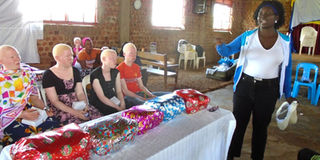Girls with albinism cry out over underage marriages

Support. Ms Mary Nakkungu, the founder of Dorcus Thabisa Ministries, hands over Christmas goodies to persons living with albinism in Kayunga Town on December 23 last year. PHOTO BY FRED MUZAALE
What you need to know:
- Concern: People living with albinism say due to their vulnerability, they are taken advantage of, which in the end leads them into misery. Fred Muzaale explores the matter.
Desperate search for love and care by adolescent girls living with albinism has been cited as one of the main forces driving the girls into underage marriages.
The girls say parents and relatives often mistreat them at home, forcing them into undesirable behaviour.
“We are easily lured into early marriages by men who show us false love in order to have sex with us. Because we do not get any love from our parents, we think that we have got people who are willing to give us love, only to be abandoned later,” Ms Tracy Birungi, a resident of Kangulumira Trading Centre in Kayunga District, said in a testimony.
Ms Birungi, a single mother of two children, said she got married at only 14 years.
Speaking last month during a Christmas party organised for persons living with albinism in Kayunga Town, Ms Birungi revealed that all her colleagues, who had got married, had been abandoned by their husbands.
The party, which is held annually, was organised by Dorcus Thabisa Ministries, a local community-based organisation.
The party is intended to bring together persons living with albinism so that they can be shown love and care.
More than 70 living persons with albinism attended the party.
Ms Mary Nakkungu, the founder of Dorcus Thabisa Ministries, said: “Most of our parents think that we are a curse to their families and worse still, when we fall in love with men, they also abandon us with the children, living us to suffer.”
Albinism is a birth defect in humans that is marked by complete or partial absence of pigment in the skin, hair and eyes.
Albinism is associated with a number of vision defects, such as photophobia, nystagmus, and amblyopic. Lack of skin pigmentation makes for more susceptibility to sunburn and skin cancers.
It is still profoundly misunderstood, socially and medically.
The physical appearance of persons with albinism is often the object of erroneous beliefs and myths influenced by superstition, which force their marginalisation and social exclusion.
This leads to various forms of stigma and discrimination.
Because of the discrimination, Ms Safia Nalule Juuko, the Member of Parliament representing People with Disability, early last year tabled the Persons with Albinism Bill, 2019.
The objective of the Bill is to provide for the comprehensive protection and promotion of the rights of persons with albinism, to provide for their registration, rehabilitation, development and well-being.
Introducing Bill
Ms Nalule, who moved the motion to introduce the Bill, said it is also aimed at providing for the role and responsibilities of both the state and non-state actors, to designate a national and district task force coordinator for persons with albinism and to achieve equalisation of people with albinism.
Although government through the Minister of Youth and children Affairs Florence Nakiwala Kiyingi said they have included albinism in a new proposal on disability, the Speaker of Parliament, Ms Rebecca Kadaga, said people living with albinism need to be protected and thereby a specific Bill is necessary.
Recently, the deputy Speaker of Parliament, Mr Jacob Oulanyah, revealed that government is working on reforms to address challenges faced by persons living with albinism.
“Parliament has been at the forefront fighting for the rights of persons living with albinism with an annual fundraising for a rehabilitation centre currently amounting to Shs75m,” Mr Oulanyah revealed.
Ms Nakkungu, who also donated clothes, foodstuffs and skin creams to the people living with albinism, urged them to always believe in themselves and seek education and skills to help them lead meaningful and independent lives.
She said she has plans to open up a skills development centre for persons living with albinism so that they can acquire skills such as tailoring to help them earn a living.
However, Ms Nakkungu added that she lacks financial resources to achieve her plan.
“The skilling centre would also act as a meeting point for persons living with albinism,” Ms Nakkungu said.
She warned parents against mistreating persons living with albinism.
Albinism
Albinism is a birth defect in humans that is marked by complete or partial absence of pigment in the skin, hair and eyes. Albinism is associated with a number of vision defects, such as photophobia, nystagmus, and amblyopic. Lack of skin pigmentation makes for more susceptibility to sunburn and skin cancers. Albinism is still profoundly misunderstood, socially and medically.




